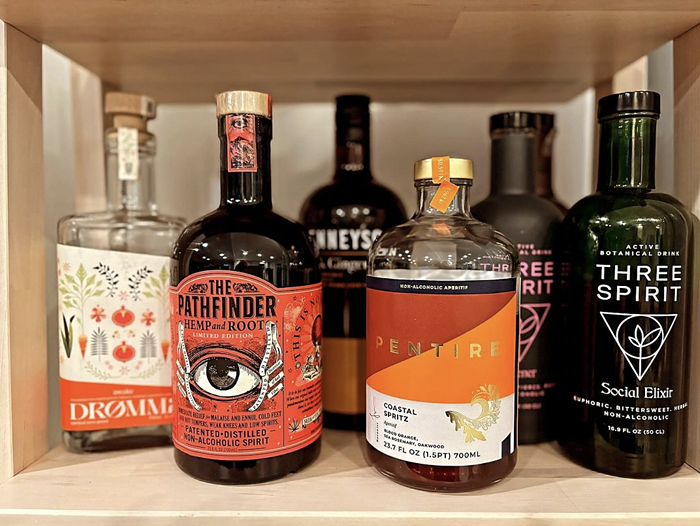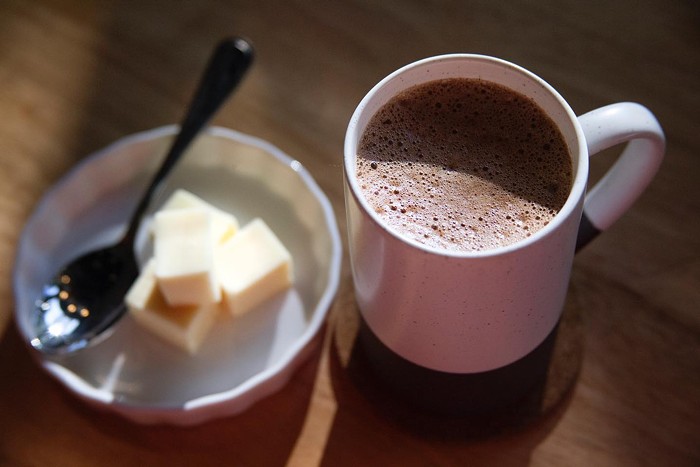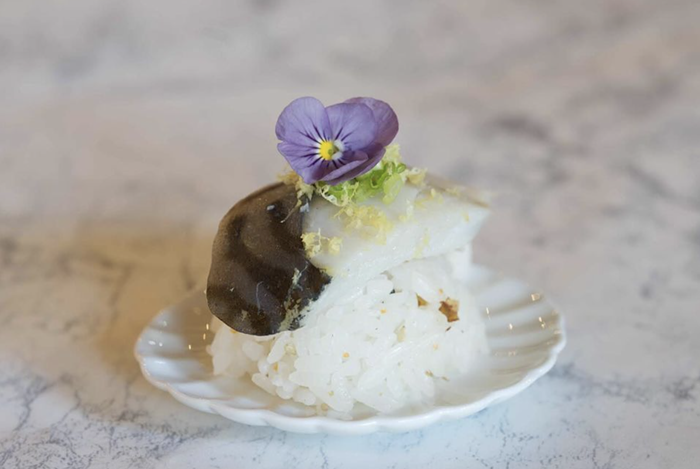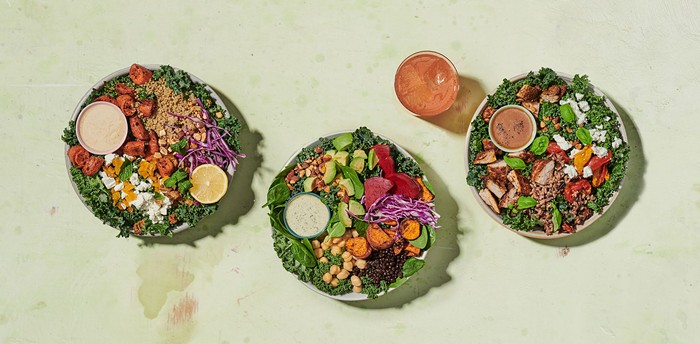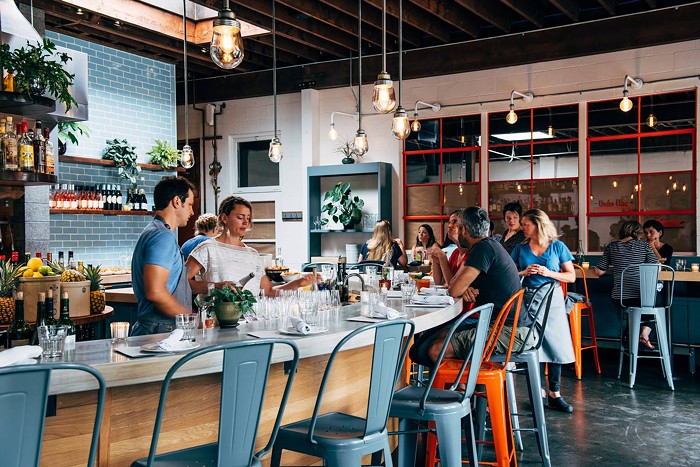To get to the burning-hottest restaurant on the West Coast—if not in the entire country—you drive a couple hours north of Seattle. (Tip: For added beauty, take Chuckanut Drive.)
About the time you start getting French radio drifting down on the airwaves from Canada, you head west; turn left when the casino rises out of nowhere in the green fields. Drive past the fireworks shacks and the hand-lettered anti-drug signs ("SUPPORT YOUR FAMILY, NOT YOUR HABIT"; "DRUGS KILL DREAMS") of the Lummi Indian Reservation, then wait at the dock. (Get out and walk around—you'll see the ferry coming in time to get back to your car.)
The Whatcom Chief holds maybe two dozen cars on its open-air deck; if you get a spot by the rail and roll down your windows, you'll feel like the captain. The crossing to dark-green Lummi Island takes about five minutes. On the other side, go right and pass the island store, the grange hall, and the house with the trees covered in Mardi Gras beads. Follow the winding road a bit more, and then there's the unassuming low building that is the Willows Inn.
The new chef at the Willows Inn is Blaine Wetzel, and anyone who's any kind of gourmand wants a seat at one of his tables. Frank Bruni from the New York Times was here at the beginning of the month (his Twitter was silent on the subject, intimating a full report to follow). Last Saturday evening, a stylish, bored-looking, iPhone-flicking couple was the subject of a photographer's attentions in the dining room, while another photographer was shooting for Seattle magazine. The woman at the desk said they expected more "special guests" the next night, and, actually, all the time lately. (She hastened to add, a little dolefully, that all the Willows' guests were, of course, special.)
Wetzel is only 25 years old. He looks about 17. He grew up in Washington, in Olympia, but he came back here to the middle of nowhere after cooking at Copenhagen's Noma—the best restaurant in the world, according to the S. Pellegrino awards (and plenty of others). Rene Redzepi, the now-legendary chef there, has revived and elevated Nordic regional cuisine; he refuses to allow imported foodstuffs like olive oil in his kitchen, and he has said that if you work with him, you're likely to start your day in the forest, collecting obscure Danish herbs and berries.
Wetzel reportedly entertained at least one offer from a restaurant in San Francisco, but Lummi is where he wanted to be. (He was a semifinalist for this year's James Beard Rising Star Chef; always behind the times, the award went to the very-much-risen Gabriel Rucker of Portland's Le Pigeon.) The rumor on the island is that the Willows was in financial trouble before Wetzel's arrival; now the Willows is flush, though everyone's a little bemused about Wetzel's allure. Locals pretty much only come to the Willows for the spot prawn feed, served on the deck on Mondays and Tuesdays from June through August. The deck (and the dining room) has a tranquil view of Rosario Strait with neighboring lumpy, fir-colored San Juan Islands and the occasional whale; the prawns are caught in the water, right there, and kept live in a tank until just before your mouth. The inn's owner, Riley Starks, nets salmon daily for dinner; herbs and other wild edibles are foraged along Lummi's five-mile length; vegetables come from the fields and greenhouse of Nettles Farm right up the hill. (Nettles-to-Willows has been farm-to-table since 2001; the farm began planting according to Wetzel's plans before he even moved to the island.)
Inside, the Willows Inn is low-ceilinged and Craftsman-style, less a stately country manse than an embrace of a place. (The Herbfarm's tassels-and-pomp suffer mightily in comparison to the Willows' comfortable restraint.) Cocktails are served before dinner fireside; most seen in hand is the chlorophyll-colored Spotted Owl, with Aviation gin and nettle puree and housemade Douglas fir eau-de-vie. It tastes like the forest in a glass, in the best possible way.
The dining room has deep brown walls, with the woodwork and beams and paneled ceiling painted white; the hardwood floor hasn't seen varnish in a long time. Fat candles burn in sconces, the tables are covered with paper, the flatware is mismatched silver plate. Some of the plates are the kind of speckled earthenware that hale Danish (or Lummi Island) potters might make. The view of the water is the star—and in the back room, you can watch the kitchen through two glass-paneled doors.
You want to know about the food, I know. But let's acknowledge that the calculus of whether or not you should go eat at the Willows Inn is not a complicated one. If all of the above—the impossibly picturesque journey, the probable prodigy returned from the master around the globe, the ingredients so fresh they might bite you back, the kitchen or my-fish-came-out-of-that-water view, the Frank Bruni, the cocktail named after a tiny, fluffy, embattled bird—has induced a Pavlovian response, you know what you need to do. (Act fast; the media has only just begun.) If $85 per person is just too much to save up for or splurge on (and you'll want wine, and a room, too), then there you are(n't). (In its category, the Willows is a bargain; Noma costs $207.)
If, somehow, you're on the fence, there's this: The food at the Willows Inn is very good—and when it's not very good, it's exquisite. Wetzel's mentor taught him better than well: He lets the ingredients do their best work, and his technique is absolutely solid, and he is unafraid of fun. I won't belabor the menu—both because you've already made up your mind and because it will be changing pretty much by the minute—but the five-course dinners also include several amuse-bouches, and the first is likely to continue to be a bite of house-smoked salmon. It's served on a bed of still-smoldering wood chips in a polished wooden box, like a present that an elf with a crush on you would leave on your doorstep; the fish tasted almost like candy. Then there was a bit of mild sauerkraut, topped with a morsel of black cod and a sprig of dill, all ferried to your mouth on top of a potato chip. Fine dining should contain more potato chips. Another snack was a very small, supercrispy toast: lightness incarnate, spread with rich brown butter, topped with adorable bitter-and-sweet miniature wildflowers. So THIS is what fairies have at their tea parties, I thought, lost in a paroxysm of joy.
We also got an extra course, one Wetzel borrowed from Noma's book: a basketful of newborn lettuces, served with a creamy, green dream of a dressing (which came in a very small clay flowerpot) and "dirt," which is made from hazelnut and malt. It got all over the table, and then people surreptitiously picked up bits with their fingertips and ate them all through the rest of the dinner (or maybe that was just me?). A soup of the farm's perfect potatoes and intensely fresh watercress, its broth of fresh whey and dill oil, also seemed Nordic; at its center was a dollop of melting Havarti cheese. Elsewhere, there was pickled fiddleheads, pine shoots, tangy baby herbs, scallops with horseradish ice, barely blowtorched spot prawns (so sweet!), Skagit River Ranch pork shoulder (slow-roasted, lacquered almost Asian-style outside, melty-fatty inside, with a sweet-and-sour onion puree). Dessert, when we finally got there, was a conflation of Granny Smith apples and buttermilk and licorice—so good, even the licorice-haters gobbled it up.
I dined with my parents and assorted extended family in the kitchen-view room—13 of us total—and they noted they'd never had a group that big before. And it must be said that the service, while very nice, had a few foibles: water and wine served on island time, that kind of thing. My cousin got glanced by a few empty champagne glasses falling off a tray, but things like that always happen to her. (Later that night, in the Willows Inn yurt, her bed collapsed.) To manufacture an extra complaint, it was too hot in there, what with the crackling fire and all. Wetzel came in and talked about the food, almost abashedly, totally charmingly. We were all invited, sincerely, to stick our heads in the kitchen if we needed anything or just to see what was going on. My cousin's wife grew up on Lummi; it turned out Wetzel now lives in her childhood home, so they talked about how it had no bathroom until her dad built one. He joked gamely about whether we could hear any profanity from the kitchen. And when we stuck our heads in, they sincerely seemed glad that we had.
So, yes, if you're on the fence, you should probably come down on the Willows Inn side. It's greener over there. ![]()

